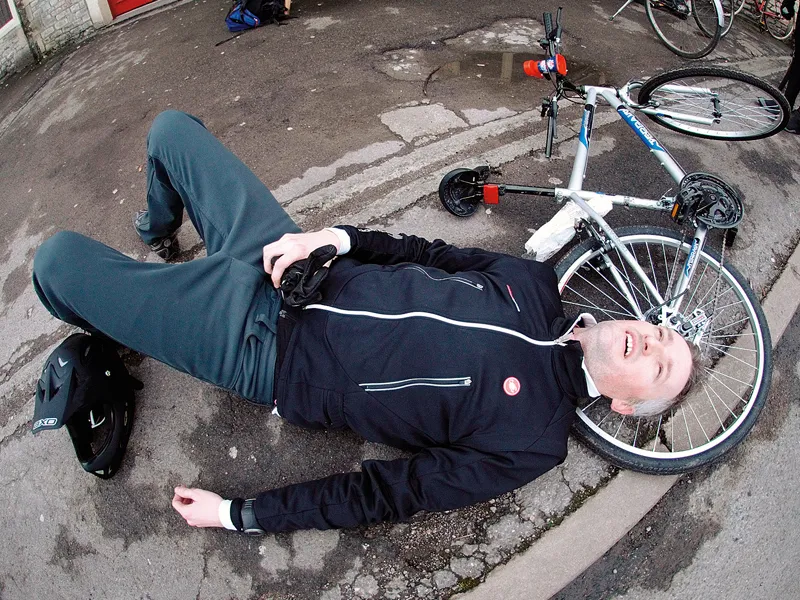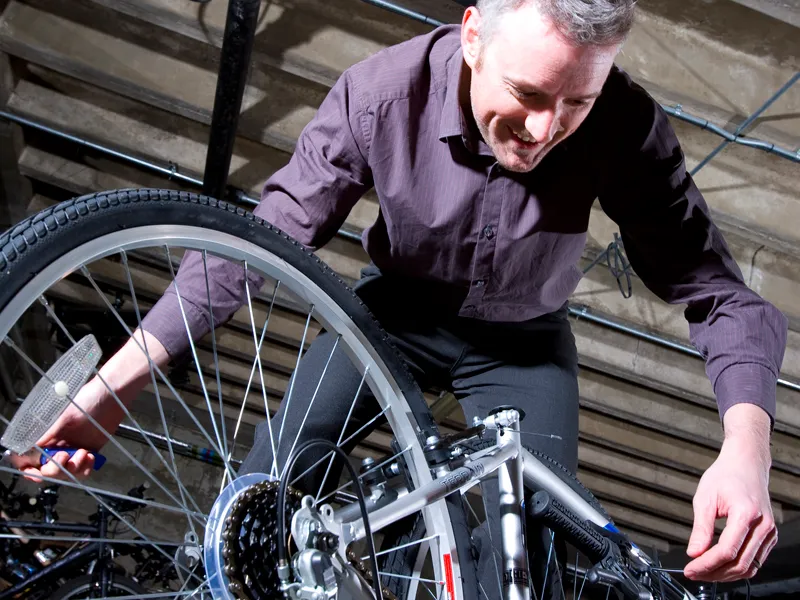UK supermarket chain Asda have hit the headlines with their claim to be selling Britain's cheapest bicycles, but are these £70 bikes the bargains they appear to be, or should buyers beware?
Of course, it's not only Asda who are selling cycles at prices we'd normally be wary of. Most supermarkets have similar models, and you'll see mail order offers in any Sunday newspaper.
The big chains can charge such low prices because they buy and sell in bulk, and sometimes even sell products at a loss in order to stimulate visits to their stores. Asda, the UK’s second largest supermarket and part of WalMart, the world’s largest retailer, say they have bought “tens of thousands" of the bikes, and claim they won't make any profit on them.
So, what are the pitfalls of buying a bike this cheap? Asda have been widely mocked on internet forums because one of the bikes pictured in their TV adverts has its forks back to front, and this highlights one of the key problems with 'supermarket specials' – you often have to assemble them yourself rather than relying on a trained shop mechanic.
Given that most of the people building these bikes won't be experienced cyclists or mechanics, there is a danger that the bikes won't be put together safely. If Asda can't get the forks the right way round, what hope is there for their customers?
First-hand experience
Mark Brown, director of the Association of Cycle Traders, has set up a blog called Bicycle Shaped Object where he describes his experiences after buying a £70 British Eagle Tulsa from Asda.
He says his aim is to "provide a realistic insight – good and bad – into what cheap bikes (aka “Bicycle Shaped Objects”) mean for customers, for cycling, for business and the environment", with the ultimate goal of a change in the law so all bicycles are sold properly assembled and set up.
Mark identified the following issues with the bike:
- Forks: Come out of the box facing the wrong way and there is nothing in the instructions to tell you to turn them. No grease on the steerer tube.
- Headset: Rusty straight out of the box.
- Pedals: Right pedal is not properly flat because thread has not been set correctly in the crank arm; very poor grip; don't see them lasting long.
- Wheels: Neither is true.
- Seatpost: Too short for a large size bike aimed at riders over 6ft tall. Plus the minimum insertion mark is so low down that there is probably not enough post inside the frame.
- V-brakes: Plastic levers flex and bend when applying any pressure.
- Tyres: Come out of the box only partly inflated and there is nothing in the instructions to tell you to inflate them.
- Tools: Supplied wheel spanner 'made of cheese' so it's impossible to adequately tighten the wheels with it.
- Frame: Sizing and angles very strange (seems very small and cramped for a large frame); made of heavy (complete bike is 40lb/18kg), low-grade steel which offers no flex/comfort.
- Controls: Grips are narrow, uncomfortable and so close to the Gripshift-style shifters that this leads to frequent accidental shifts.
- Saddle: Uncomfortable, with lots of padding but no flex.
But on the blog, he admits: "I was secretly hoping that there would be untold problems but the truth is that so far – and we are only talking one ride – everything that needs to work properly has done so.
"Some readers are probably disappointed I haven’t made it sound worse but I think a balanced view is important, and anyhow wait til you hear about the ride… I don’t think I have ever ridden a bicycle which made me want to cycle less often. The ride quality and feel of this bike is terrible."
Second opinion
Guardian newspaper reporter Helen Pidd had similar complaints with the British Eagle Verona she bought from Asda, and compared the annoying ghost shifting to going to the cinema and having someone kick the back of your seat all the way though the film.
She noticed some additional flaws: her women's bike was fitted with a men's saddle; the headset was loose; and the rear derailleur was hooked onto the axle, rather than bolted to the frame, making it almost impossible to adjust the gears properly.
"Every time I was due to set out on it, I cast a jealous glance at my lovely, nimble racer and prepared myself for the unpleasant ride ahead," she said. "This is the real downer with cheap bikes: they put you off cycling."
What the experts say
Asda may claim to sell the cheapest bikes in Britain but there are plenty of other bargain models we'd be just as wary of. Our own Rob Spedding, editor of Cycling Plus, put a Terrain Ascent from Tesco to the test as part of the magazine's sub-£100 bike 'Scrap heap challenge' earlier this year (issue 221).
He didn't have high hopes after picking it up in a sale for £40, but struggled with building it, pretzeled the back wheel within 10 minutes of riding and lost a crank after less than 20 miles. He summed up the experience by saying: “It was, in all honesty, the least fun I’ve ever had on a bike."

Rob Spedding was a broken man after riding 30 miles on his £40 Tesco special
Asked what he thought a beginner should look at spending on a bike, Rob said: "You can pick up a cool urban commuter for £200-£300, such as a Ridgeback or a Carrera Subway from Halfords. They're not going to be exciting and they're going to have pretty low-end groupsets and equipment, but if you're just starting to get into cycling, they're fine.
"If you see cycling as more of a long-term commitment and want a proper road bike you should spend more – we'll have a review of four £750-£900 bikes in our next issue [CYP227]. Spend as much as you can afford and you won't regret it."
Matt Skinner, editor of What Mountain Bike, said he would advise people never to spend less than £400 on a new bike if they planned to use if off-road. If they had less than this to spend, they should look for a second-hand or sale bargain rather than buying new.
"It's a false economy to buy a new bike that costs less than £400 because the labour charges for the repairs you will need will easily add up to more than the value of the bike," he said.
The Great British public
Amanda and Lynn McDonald, a young married couple from Taunton, Somerset bought two bikes on eBay shortly after Christmas for about £150.
Lynn said he was really happy with his 18-speed Universal Fusion (RRP £90). "I haven't been riding as much as I should – only three or four times – but the bike's really good," he said. "It's quite comfortable and I've got no complaints. I didn't want to spend any more because I'm not really into bikes."
Amanda was less impressed with hers, saying she had been put off riding it by the poor build quality and welding, slipping gears and hard men's saddle.
Final thoughts
On his blog, Mark comes to a similar conclusion to our magazine experts: "The problem with cheap bikes – if we put aside that pesky safety issue – is that they don’t make cycling an enjoyable long-term experience. They could be putting people off cycling altogether or limiting their cycle usage."
But he acknowledges there is a counter-argument: "If cheap bikes gets some use and lead to some people cycling more often, and in turn changing their habits and possibly getting a 'proper bike' in time, then surely they have a part to play, and at the end of the day not everyone wants – or can afford – to spend more on a bicycle."
A spokeswoman for Asda defended their bikes, saying: "Our not-for-profit £70 and £50 bikes have been selling incredibly well, with over 20,000 sold in the first week of being in-store.
"Our bikes are made by Falcon and have undergone rigorous testing and inspection during the manufacturing process.
"General customer feedback on the bikes has been very positive and it's great that our customers can now stay active and healthy without breaking the bank."
BikeRadar contacted Tesco for a comment but had not received a response at time of publication.
What do you think about budget bikes? Do they ruin people's enjoyment of cycling, or are their detractors just bike snobs? Should there be a law to make sure they are assembled safely? What do you think is a sensible price to pay? Have your say in the comments box below.

